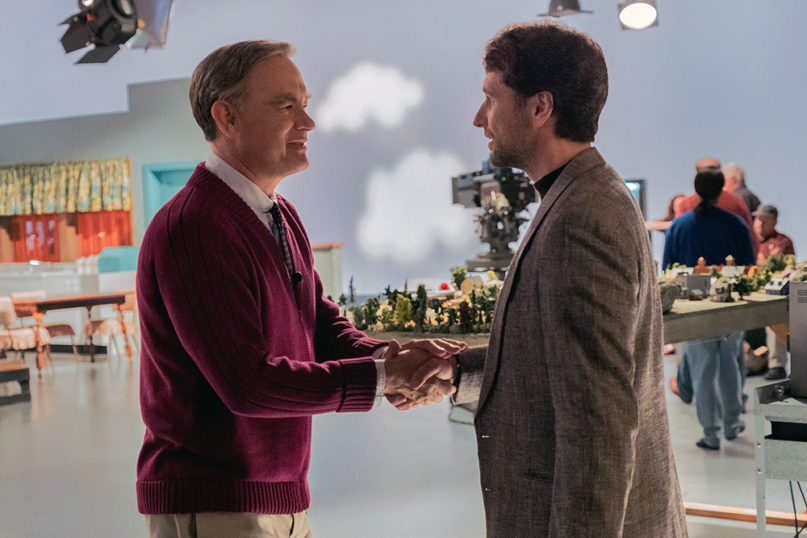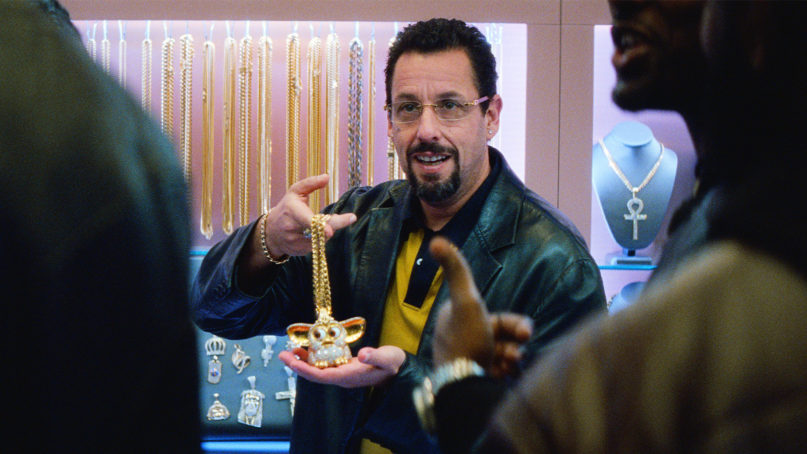Stop whatever you are doing (within reason), and go home and watch “The Two Popes.”
This is the Netflix film about the unfolding relationship between the conservative Pope Benedict XVI (Cardinal Joseph Ratzinger) and his more liberal successor, Pope Francis (Cardinal Jorge Mario Bergoglio). Its most powerful scenes are of Burgoglio’s early life and career in Argentina, especially during the horrific days of the junta.
The acting is wonderful. Jonathan Pryce as Francis won an Academy Award nomination for best actor. Anthony Hopkins as Benedict won a nomination for acting in a supporting role.
But, more than that, this film is the most powerful depiction of religious faith and its struggles that I have ever seen.
A close second: “A Beautiful Day in the Neighborhood,” the bio pic about Fred Rogers, who was an ordained Presbyterian minister and who saw his television work as his ministry.

Mister Rogers, played by Tom Hanks, meets journalist Lloyd Vogel, played by Matthew Rhys, in TriStar Pictures’ “A Beautiful Day In The Neighborhood.” Photo by Lacey Terrell ©2019 CTMG, Inc. All rights reserved.
All of which gets me thinking: where is the Jewish “equivalent” of this film?
Granted: the Academy snubbed Adam Sandler as jeweler Howard Ratner in “Uncut Gems.” Ethnically speaking, it is the most “Jewish” movie of the year. (Was it “good for the Jews,” a friend asked me. “No worse than six seasons of ‘The Sopranos’ was for Italians,” I responded.)
For those Jew-haters who think that “the Jews” dominate the entertainment industry — yeah, right. True: there are a lot of Jewish names in Hollywood. But, the number of films that depict the depth of Jewish faith is rather small.
There are Jewish films about faith that we need to see — right now.
Here is my wish list.
-
- “The Temple Bombing.” Based on the book by Melissa Fay Greene, the film would be about the 1958 bombing of The Temple in Atlanta, because of the preaching and activism of its rabbi, Jacob Rothschild. The film would start with young Rabbi Rothschild’s arrival in Atlanta in 1946; his encounters with Southern racism; his determination to lead his congregation in the emerging struggle for civil rights; the pushback from his congregants and friends; the bombing of the Temple by white supremacists; the investigation and the legal process. My “nomination” for the role of Rabbi Rothschild: Victor Garber. The Klan will play itself.
- “The Cantor and the Nazi.” Based on the true story of Cantor Michael Weisser who moves to Lincoln, Nebraska and finds himself harassed by Larry Trapp, the Grand Dragon of the White Nights of the Ku Klux Klan. The cantor locates the bigot, and discovers that he is a paraplegic, confined to his home in a wheelchair. They get to talking. The KKK leader confesses that he has come to abhor his racism. He asks the cantor to teach him about Judaism. The cantor does so, and the former white supremacist converts to Judaism. When the former bigot is no longer able to care for himself, the cantor and his wife, Julie, take Larry into their home. Larry dies, and the entire city of Lincoln comes out to his funeral, which takes place in the synagogue. A black leader, whom Larry had once harassed, gives the eulogy. Based on the book Not By The Sword. Larry Trapp: Billy Bob Thornton. Cantor Weisser: Nick Offerman
- “The Maccabees.” Mel Gibson had been producing a movie on this theme, but the project has been on hold. Time for someone like Stephen Spielberg to take over. Even better — Quentin Tarantino. He could simply replicate the tough Jews theme from “Inglorious Basterds.” “The Maccabees” would have it all: deep faith, bloodshed, family drama, gore, cultural clashes, violence, battles, mayhem. Judah Maccabee: Russell Crowe. He already learned all the good moves in “Gladiator.”
- “I Lift My Lamp.” A bio-pic about Emma Lazarus, the activist and author who wrote the poem, “The New Colossus” that adorns the Statue of Liberty in New York Harbor. Great scenes of her visits to Czarist Russia to investigate the plight of the Jews. Emma: Cynthia Nixon.
- “The King of Children,” based on the book of the same name. The story of Janusz Korczak, the Polish-Jewish educator, author, and protector of children. He accompanied his orphans when they were deported from the Warsaw Ghetto to the Treblinka extermination camp. Korczak was one of the greatest moral heroes of Jewish history, and about as close as we get to a Jewish version of the aforementioned Fred Rogers. Korczak: Michael Gambon.
Here is the point. Jewish history is loaded with moments of inspiration, faith, and moral courage.
If we are truly a “light to the nations,” let us be that light — even and especially in a darkened movie theater.
Roll ’em.






